In recent years, there’s been a noticeable shift in the leadership landscape at some of the world’s most influential companies. Engineers, scientists, and other technical professionals are increasingly stepping into executive roles, driving innovation and decision-making at the highest levels. According to a 2021 study by Korn Ferry, nearly 30% of Fortune 500 CEOs have an engineering background. This reflects the growing value of problem-solving, analytical thinking, and deep technical expertise in today’s complex business environment.
This trend isn’t confined to the corporate giants. Across industries, technical leaders are leveraging their expertise to shape company strategies, improve operations, and innovate in ways that traditional business backgrounds often struggle to match. However, this transition is not without its challenges.
Moving from a technical role to a leadership position requires more than just domain expertise. It demands a broad set of skills, including financial acumen, people management, and strategic thinking. Engineers often find themselves asking:
For many, these challenges can feel daunting. Yet, the answer lies in leveraging the strengths that make engineers great problem-solvers: their ability to analyze, adapt, and execute under pressure.
Justin Dean’s career offers an inspiring example of navigating this transition. Starting as an electrical engineer with a focus on control systems and automation, Justin worked on high-pressure projects across six continents, designing solutions for everything from motor control systems to test facilities. Over time, he leveraged this experience to found multiple businesses, eventually stepping into private equity to help others grow their ventures.
What sets Justin apart is his ability to balance both worlds. He didn’t abandon his technical roots when he moved into business leadership. Instead, he used his technical knowledge to build trust with clients, optimize operations, and solve complex problems for the companies he led.
Justin’s journey highlights several key lessons for engineers looking to transition into leadership roles:
The growing presence of engineers in leadership reflects the increasing complexity of today’s business challenges. Leaders with technical expertise bring unique perspectives to innovation, operational efficiency, and problem-solving. However, the transition requires a shift in mindset—from focusing on individual tasks to guiding teams and aligning technical efforts with business objectives.
Justin Dean’s story offers valuable inspiration for those navigating this journey. As we dive deeper into the lessons from his career, we’ll explore actionable strategies for engineers and technical professionals who want to take the next step in their careers.
For many engineers, the career path is traditionally linear: develop expertise in a specific technical domain, gain experience solving increasingly complex problems, and become a trusted expert within that niche. However, when an engineer decides to step into a business leadership role, the path suddenly becomes less defined.
The transition from technical expert to business leader presents unique challenges. Engineers are often faced with a steep learning curve as they move beyond technical problem-solving to managing people, driving strategy, and navigating the financial complexities of running a business. These challenges can include:
Recognizing these challenges, more technical professionals are seeking leadership training to prepare for business roles. A study by the National Association of Colleges and Employers (NACE) found that STEM graduates are increasingly pursuing MBAs and leadership programs, seeing these as essential tools for career growth. Business schools have also responded to this trend, with many offering programs tailored to technical professionals, such as Carnegie Mellon’s Master of Science in Product Management or MIT’s Sloan Fellows MBA.
This shift reflects a growing recognition that technical expertise alone is not enough to lead effectively in today’s business landscape. Engineers who aspire to leadership roles need to pair their technical acumen with strong communication, financial, and strategic thinking skills.
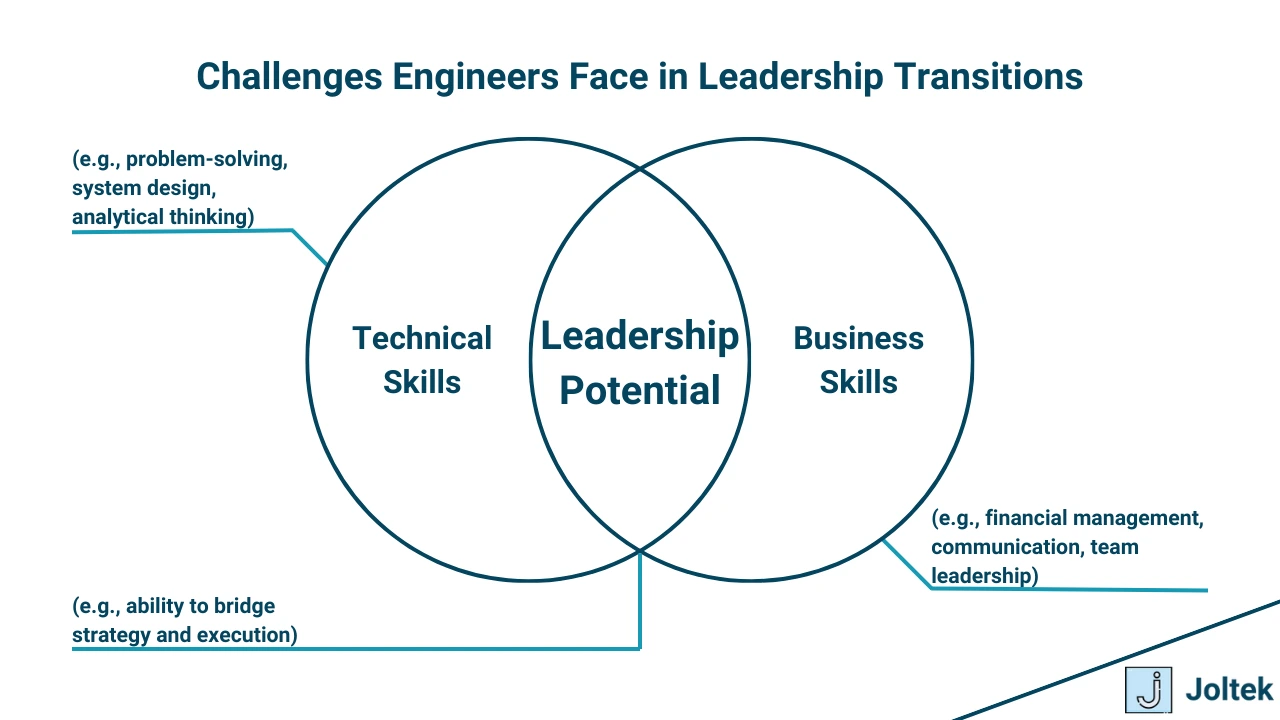
Justin Dean’s career perfectly illustrates both the challenges and opportunities of this transition. As an electrical engineer, Justin’s expertise in designing control systems and automation solutions earned him recognition in his field. His work spanned six continents and involved high-stakes projects, from complex motor designs to fully automated test systems.
When Justin moved into business leadership by founding his own company, he brought his technical strengths to the table. This became a key differentiator for him as a business leader. While he learned new skills in sales and financial management, Justin’s deep technical knowledge helped him build trust with clients. He was able to speak their language, understand their challenges, and propose solutions grounded in expertise.
For instance, when a project required designing a control system for a new facility, Justin didn’t just manage the process—he actively contributed to creating a solution. His ability to bridge the gap between technical and business conversations reassured clients that they were in capable hands.
The transition from technical expert to business leader may seem daunting, but it’s a path filled with opportunity. Engineers bring a unique skill set to leadership roles, including analytical thinking, attention to detail, and a problem-solving mindset. By pairing these strengths with new skills in finance, communication, and strategy, technical professionals can thrive in business leadership roles.
In the next section, we’ll explore how engineers can build businesses rooted in their expertise, turning their technical skills into high-value services.
For engineers looking to transition into entrepreneurship, the most natural starting point is leveraging what they know best: their technical skills. Turning expertise into marketable services is the foundation for building a successful business. By focusing on solving specific problems within their domain, engineers can carve out a niche and create value for clients who need those solutions.
Justin Dean exemplifies this approach. Early in his career, Justin developed a deep understanding of control systems, automation, and test systems. When he founded his own company, he didn’t try to reinvent the wheel—he leveraged these strengths to provide specialized services. His initial projects focused on addressing automation and control challenges for clients, a niche where he had both expertise and credibility. By staying close to his core competencies, Justin was able to build trust with customers and deliver high-impact results.
One of the most effective strategies for technical entrepreneurs is to focus on solving niche problems. In a competitive market, being a generalist can dilute your value proposition, especially in the early stages of building a business. Specialization allows engineers to:
For example, an engineer specializing in industrial automation might focus on designing energy-efficient control systems for manufacturing plants. By solving a specific problem for a targeted audience, they can position themselves as an expert and establish a foundation for long-term growth.
Engineers looking to start a business can follow these steps to identify opportunities rooted in their technical expertise:
Elon Musk’s journey offers another powerful example of building businesses with technical roots. Musk started his career in engineering-intensive industries like software (Zip2 and PayPal), later transitioning to highly technical sectors such as automotive (Tesla) and aerospace (SpaceX). His ability to combine technical expertise with a bold vision for solving industry-specific challenges has been a cornerstone of his success.
While Musk’s ventures are ambitious, his approach can be applied on a smaller scale. By identifying gaps in the market and applying technical expertise to solve them, engineers can create businesses that are both impactful and profitable.
The most successful technical businesses are rooted in expertise and focused on solving real problems. By identifying a niche, leveraging core skills, and addressing specific market needs, engineers can build businesses that stand out in competitive industries. Specialization in the early stages provides a strong foundation for growth and establishes credibility with clients.
In the next section, we’ll explore how engineers can bridge the gap between technical expertise and leadership, focusing on the skills and strategies needed to manage teams, finances, and long-term business goals.
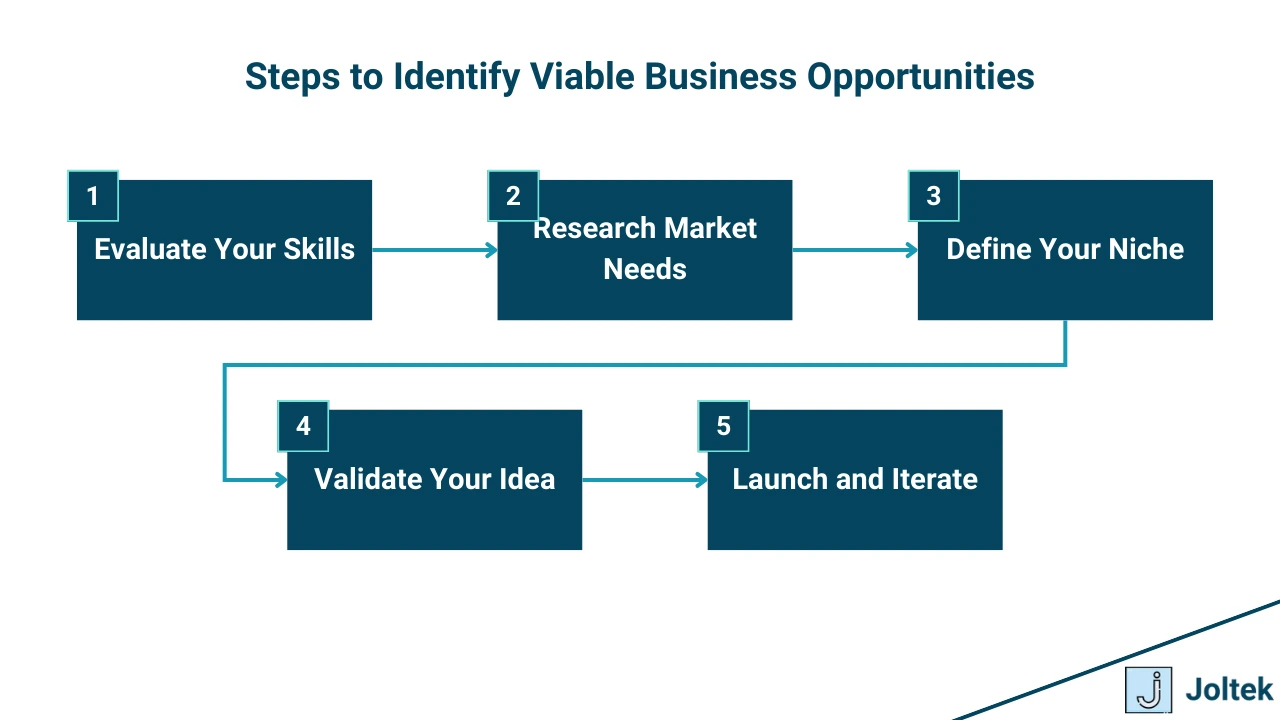
Transitioning from a technical role to a leadership position involves developing a completely new set of skills. While engineers are accustomed to solving technical problems, leadership requires mastering areas like sales, financial management, and strategic planning—skills that are often outside the traditional engineering curriculum.
Justin Dean’s career provides a clear example of how technical professionals can successfully bridge this gap. As he began running his own business, Justin quickly realized that being technically skilled wasn’t enough to lead a company. He needed to learn how to craft proposals, manage budgets, and engage in sales conversations with clients. By adopting a hands-on approach and applying his problem-solving mindset, Justin gained the knowledge needed to effectively run and grow his business.
One of the greatest advantages engineers bring to leadership is their problem-solving mindset. Engineers are trained to approach challenges systematically, break them down into manageable components, and design solutions that are both practical and innovative. These same principles can be applied to business challenges like:
Example: Justin’s ability to combine his technical knowledge with a newfound understanding of client needs allowed him to build trust and close deals. Clients appreciated his ability to articulate solutions in a way that addressed both their technical and business concerns.
Many organizations and academic institutions recognize the growing need for engineers to step into leadership roles and have developed programs tailored to this transition. Some notable examples include:
Research also supports the idea that engineers can become effective leaders by leveraging their analytical skills. A study published in Harvard Business Review found that technical leaders who adopt a “systems thinking” approach often outperform those with purely business backgrounds, as they can bridge gaps between operational and strategic goals.
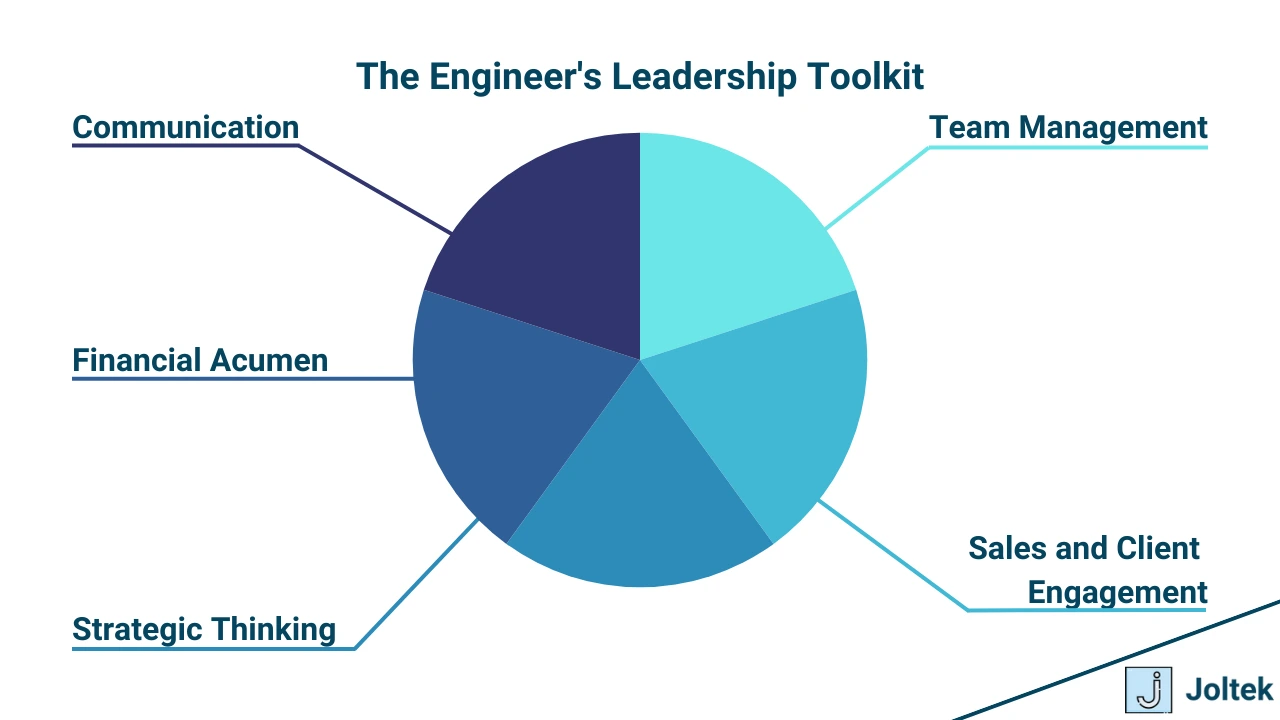
Leadership for engineers isn’t about abandoning your technical roots—it’s about expanding your skill set to include business and people management. By applying problem-solving techniques to new areas, investing in continuous learning, and seeking mentorship, engineers can successfully transition into leadership roles.
In the next section, we’ll explore how private equity and investments offer unique opportunities for technical professionals to shape and grow businesses, providing value through their deep expertise.
Private equity (PE) might not seem like an obvious career move for engineers, but in many ways, it’s a perfect match. Engineers bring a unique perspective to PE firms, particularly when investing in technical businesses like manufacturing, automation, or technology startups. Their ability to conduct technical due diligence, identify inefficiencies, and propose scalable solutions makes them valuable assets in evaluating and growing portfolio companies.
Justin Dean’s journey illustrates this synergy. After years of building and scaling his own businesses, Justin entered the private equity space with a focus on mentoring and investing in companies. His technical expertise allowed him to identify opportunities others might overlook, such as improving operational efficiency, leveraging automation, or addressing technical bottlenecks that hinder growth. By combining his engineering mindset with business acumen, Justin helped companies align their technical operations with broader strategic goals.
Private equity thrives on evaluating and improving businesses, and engineers are uniquely suited for this task. Here’s why:
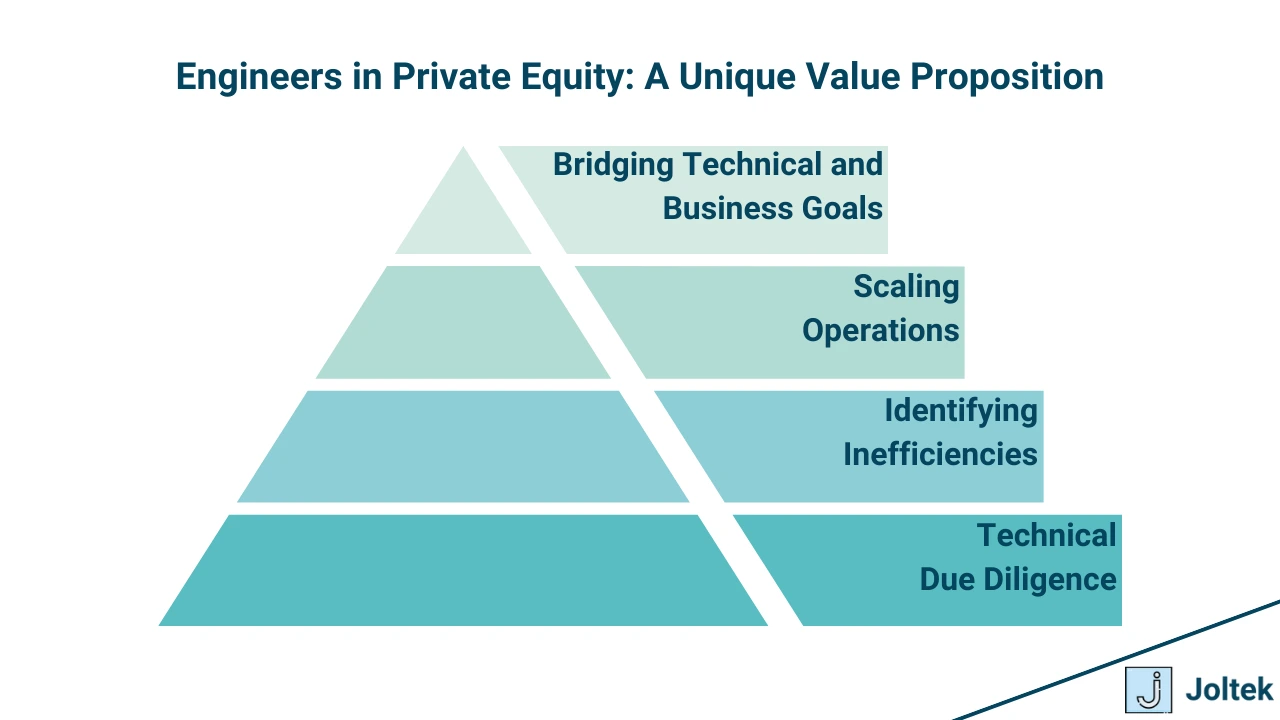
Private equity investment in manufacturing and industrial automation has surged in recent years, driven by advancements in technology and a growing demand for efficiency. Automation startups, robotics companies, and industrial AI solutions have become hot targets for investors.
This trend reflects a broader recognition of the value engineers bring to private equity-backed businesses. Investors increasingly rely on technical expertise to unlock value in their portfolio companies, particularly in capital-intensive industries like manufacturing.
For engineers considering a career in private equity or investments, there are clear opportunities to contribute value:
Private equity and technical expertise are a powerful combination. Engineers bring unique value to the investment process by providing technical insight, identifying inefficiencies, and scaling operations effectively. As private equity continues to target industries like manufacturing and automation, the demand for technically savvy professionals in this space is only growing.
In the next section, we’ll look at how artificial intelligence is reshaping the manufacturing landscape and how leaders can harness its potential to optimize operations and empower their workforce.
Artificial intelligence (AI) is transforming industries worldwide, and manufacturing is no exception. AI has the potential to revolutionize production processes, optimize supply chains, and improve decision-making across the enterprise. However, with this transformation comes questions about how AI will impact the workforce and leadership in manufacturing.
Justin Dean offers a balanced perspective on AI’s role in the industry. Rather than viewing AI as a tool to replace workers, Justin sees it as a means to enhance employee productivity and decision-making. By empowering workers with AI-driven insights and tools, manufacturers can create a more efficient and resilient workforce while maintaining human oversight and expertise.
AI is already being deployed across the manufacturing value chain, delivering measurable benefits in several areas:
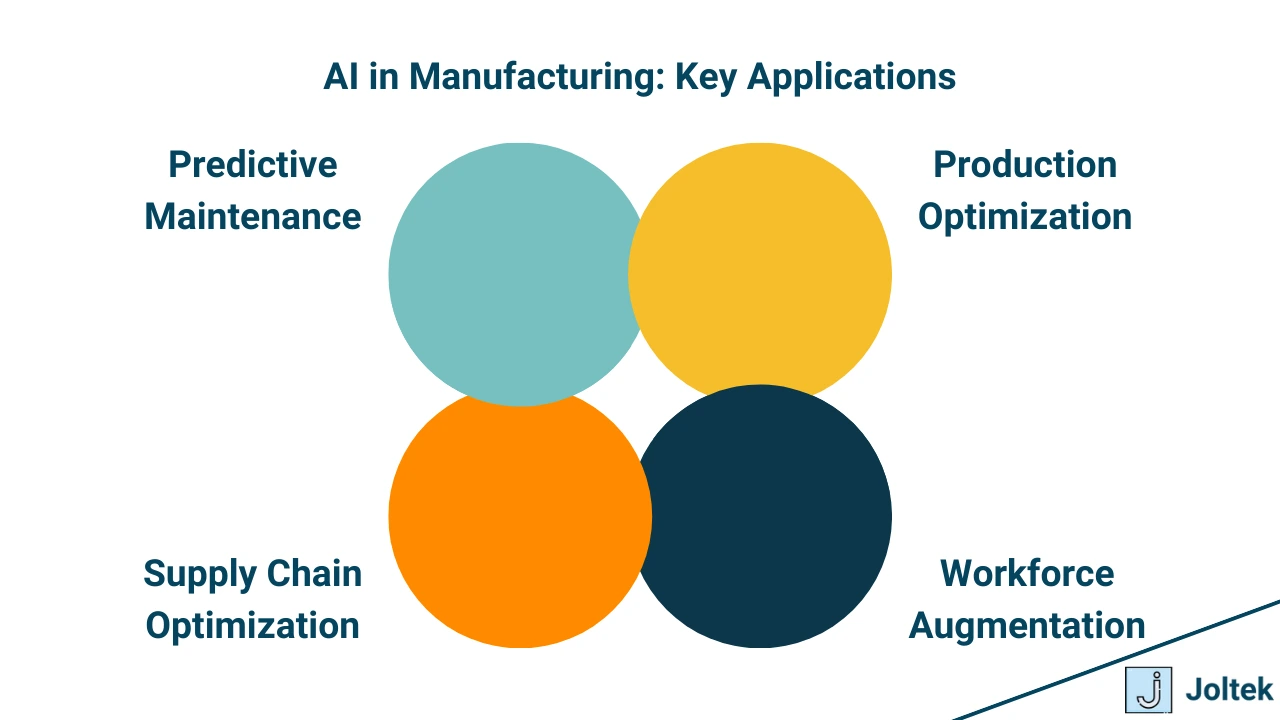
Research from leading firms provides insights into the broader implications of AI adoption in manufacturing:
While there is concern about automation displacing certain jobs, these studies emphasize that AI is more likely to augment human roles than replace them. Workers equipped with AI tools can perform tasks more efficiently and focus on higher-value activities, such as problem-solving and innovation.
AI is a powerful tool for manufacturers to enhance productivity, optimize processes, and support their workforce. Leaders who embrace AI not as a replacement for employees but as a tool to augment their capabilities will be better positioned to drive innovation and long-term success.
As Justin Dean suggests, the focus should be on empowering workers with AI tools, enabling them to make better decisions, work more efficiently, and tackle complex challenges. By integrating AI thoughtfully, manufacturing leaders can create an ecosystem where both technology and people thrive.
In the final section, we’ll explore actionable advice for engineers, entrepreneurs, and leaders looking to harness these insights to build successful businesses and careers.
For engineers who dream of starting their own business or stepping into leadership roles, the journey can be as challenging as it is rewarding. The key is to leverage your unique technical expertise while acquiring the business acumen needed to succeed. Justin Dean’s career offers a wealth of insights for aspiring engineer-entrepreneurs looking to take the leap.
Here are some key lessons from Justin’s experience:
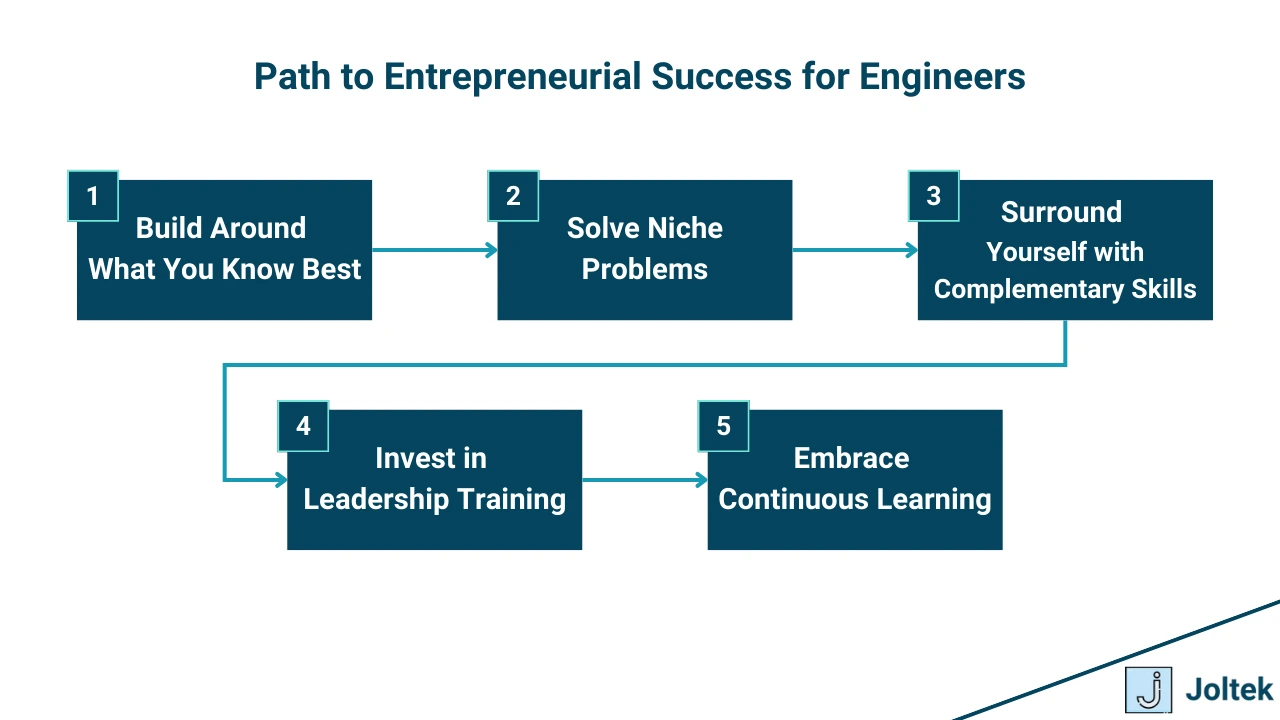
Engineering expertise is a powerful foundation for building a business, but success requires expanding beyond technical skills. By combining technical knowledge with business acumen, surrounding yourself with a strong team, and committing to continuous growth, engineers can create impactful and sustainable ventures.
Justin Dean’s journey demonstrates that the path from engineer to entrepreneur is not only achievable but also uniquely rewarding. For those ready to chart their own path, the key is to start with what you know, stay curious, and embrace the challenges along the way.
In conclusion, whether you’re launching a business, taking on leadership responsibilities, or exploring new opportunities, the lessons from this discussion provide a roadmap for turning technical expertise into entrepreneurial success.
Engineers and technical professionals are uniquely positioned to thrive in business and leadership roles. Their analytical mindset, problem-solving abilities, and deep technical expertise give them an edge in tackling complex challenges and driving innovation. However, as Justin Dean’s journey demonstrates, success in these roles requires more than technical skill. By embracing leadership responsibilities, continuously learning, and leveraging their expertise, engineers can navigate the intersection of technology and business to create lasting impact.
The path isn’t without its challenges, but the rewards are significant. Engineers who step into leadership positions can drive transformation, solve high-value problems, and contribute meaningfully to the industries they serve. The key is to balance technical strengths with strategic thinking, surround yourself with complementary skills, and adopt a mindset of perpetual growth and innovation.
The intersection of engineering and leadership is a powerful space for growth and innovation. Whether you’re a technical professional looking to take the next step in your career or a decision-maker seeking to empower your teams, the time to act is now. Let’s continue the conversation—share your thoughts, challenges, and successes in the comments below. Together, we can shape the future of leadership in manufacturing and beyond.